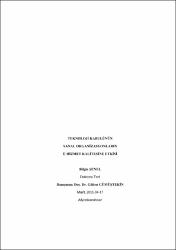| dc.contributor.advisor | Gümüştekin, Gülten | |
| dc.contributor.author | Şenel, Bilgin | |
| dc.date.accessioned | 2015-01-28T09:40:02Z | |
| dc.date.available | 2015-01-28T09:40:02Z | |
| dc.date.issued | 2011 | |
| dc.date.submitted | 2011 | |
| dc.identifier.citation | Şenel Bilgin ''Teknoloji Kabulünün Sanal Organizasyonların E-Hizmet Kalitesine Etkisi’’ ‘’The Effect Of Technology Acceptance On E-Serves Quality Of Virtual Organization’’ Afyon Kocatepe Üniversitesi Afyonkarahisar 2011 | en_US |
| dc.identifier.uri | http://hdl.handle.net/11630/1720 | |
| dc.description.abstract | Sanal organizasyonlarda müşteri sürekliliğinin sağlanabilmesinde tüketicilerin bilişim teknolojilerini kabul etmeleri oldukça önemlidir. Müşteriler teknolojiyi kabul ettikleri ölçüde sanal organizasyonlarla olan ilişkilerini geliştirler. Müşterilerin sürekliliğinde önemli olan bir diğer kavram ise algıladıkları hizmet kalitesidir. Algıladıkları hizmet kalitesi yükseldikçe müşteri tatmini ve sadakati yaratılabilir.
Müşterilerin bilişim teknolojilerini kabul etmede ve kullanmada gösterdikleri isteksizlik, sanal organizasyonların algılanan hizmet kalitesinde beklenen kazanımların elde edilmesinde önemli engellerden biri olarak düşünülebilir. Buradan yola çıkılarak bu çalışmada, sanal ortamda faaliyet gösteren sanal organizasyon müşterilerinin Teknoloji Kabulünün, algıladıkları E-Hizmet Kalitesine bir etkisinin olup olmadığının belirlenmesi amaçlanmıştır.
Bu amacı yerine getirirken psikolojik, sosyolojik ve ekonomik ihtiyaçlar gibi gizil yapıların değerlendirilmesine imkân sağlayan ve oldukça güçlü çok değişkenli analiz tekniği olan Yapısal Eşitlik Modeli(YEM) ve belirsizliğin ölçülmesinde güçlü ve anlamlı araçlar sunan, doğal dilde ifade edilen belirsiz kavramların anlamlı bir şekilde temsil edilebilmesini sağlayan Bulanık Mantık Teorisi kullanılmıştır.
Türkiye yapısını temsil ettiği düşünülen beş büyük ilde (İstanbul, Ankara, İzmir, Eskişehir, Bursa) sanal organizasyonlardan en az 3 defa sanal alış veriş yapmış olan 415 adet müşterilerden alınan veriler üçgen tipinde üyelik fonksiyonu kullanılarak durulaştırılmıştır. Elde edilen durulaştırılmış verilerin 0,770 gibi istenilen güvenilirlik seviyesine ulaşılmasının ardından, LİSREL 8.80 programı kullanılarak doğrulayıcı faktör analizi yapılmıştır. Faktör analizinden sonra sanal organizasyon müşterilerinin teknoloj i kullanımında gerçekleşen davranış ve sanal organizasyonların hizmetlerinin kalitesi modelleri yapısal olarak geliştirilerek konuyu etkilediği düşünülen faktörlerin etki dereceleri hesaplanmıştır.
Çıkan sonuçlara göre, teknoloj i kabulünde katılımcıların gerçekleştirdikleri davranışların katılımcıların kullandıkları sanal alış veriş sitelerinin sunmuş oldukları hizmetin kalitesini 0,17 ile açıkladığı bulunmuştur. Buradan sonuçla katılımcıların teknoloji ile kurdukları yakın bağın sunulan hizmetin kalitesini etkilediği söylenebilir. Sanal organizasyon müşterilerinin teknolojiyi daha çok kabul etmelerinin sağlanmasıyla, sunulan hizmetlerin kalitesinin bugünden daha iyi anlaşılacağı bu çalışma ile ortaya konulmuştur. | en_US |
| dc.description.abstract | virtual organizations the continuity of customers by consumers’ acceptance of information technologies is considerably important. Relations with virtual organizations develop to the extent customers accept the technology. Another important concept in the continuity of customers is the perceived quality of service. As the perception of service quality increases customer satisfaction and loyalty can be created.
In the acceptance and use of information technologies, reluctance shown by customers is considered as an important obstacle in the gains expected by virtual organizations in the perceived quality of service. Based on these assumptions, this paper’s purpose is to identify whether the acceptance of technology and the perceived e-service quality by customers of organizations active in the virtual environment has an affect or not.
In undertaking this purpose, the Structural Equality Model (SEM) that provides the opportunity to evaluate hidden structures of psychological, sociological and economic and similar needs and which is a highly powerful multivariate analysis technique and the Fuzzy Logic Theory which provides powerful and meaningful vehicles in measuring indecisiveness and which also provides a meaningful representation of ambiguous concepts expressed in natural language will be utilized.
Data from 415 customers that have undertaken a minimum 3 virtual shopping from virtual organizations in the five largest provinces (Istanbul, Ankara, Izmir, Eskişehir and Bursa) that are assumed to represent the structure of Turkey were clarified using a triangle type membership function. After obtaining the intended
0. 770 reliability level for the clarified data obtained, the LISREL 8.80 program was used for a confirmatory factor analysis. Subsequent to the factor analysis, the behavior shown in the use of technology by virtual organization customers and, by structurally developing the quality models of the services of virtual organizations, the degree of influence of factors that are considered to influence the subject matter were calculated.
According to the results obtained, the behavior shown by participants in accepting technology was found to be 0.17 in the quality of services provided by virtual shopping websites used by the participants. From here it can be said that the close ties established by the participants to technology influences the quality of the service offered. By obtaining more acceptance of technology by virtual organization customers the quality of services presented will be better understood than at present has been revealed with this study. | en_US |
| dc.language.iso | tur | en_US |
| dc.publisher | Afyon Kocatepe Üniversitesi Sosyal Bilimler Enstitüsü | en_US |
| dc.rights | info:eu-repo/semantics/openAccess | en_US |
| dc.subject | Sanal Organizasyon | en_US |
| dc.subject | Teknoloji Kabul Modeli | en_US |
| dc.subject | Elektronik Hizmet Kalitesi | en_US |
| dc.subject | Yapısal Eşitlik Modellemesi | en_US |
| dc.subject | Bulanık Mantık | en_US |
| dc.title | Teknoloji Kabulünün Sanal Organizasyonların E-Hizmet Kalitesine Etkisi | en_US |
| dc.title.alternative | The Effect Of Technology Acceptance On E-Serves Quality Of Virtual Organization | en_US |
| dc.type | doctoralThesis | en_US |
| dc.department | Afyon Kocatepe Üniversitesi Sosyal Bilimler Enstitüsü İşletme Anabilimdalı | en_US |
| dc.authorid | TR147940 | en_US |
| dc.relation.publicationcategory | Tez | en_US |



















